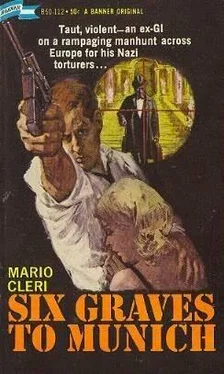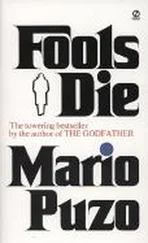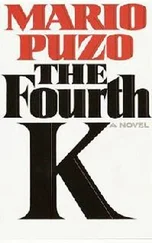All seven wore swastika armbands, but two men wore tunics of different shades. From this and the collar insignia, Rogan knew that one of them was with the Hungarian armed forces and the other was with the Italian army. These two took no part in the interrogation at first; they were official observers.
The chief of the interrogation team was a tall, aristocratic officer with deep-set eyes. He assured Rogan that all they wanted was the codes stored in his head, and then Rogan and his wife and the unborn child would live. They hammered at him all that first day, and Rogan stood mute. He refused to answer any questions. Then on the night of the second day he heard Christine’s voice screaming for help in the next room. She kept calling his name, screaming, “Michel! Michel!” over and over. She was in agony. Rogan looked at the burning eyes of the chief interrogator and whispered, “Stop that. Stop. I’ll tell you everything.”
For the next five days he gave them old, discarded code combinations. In some way, perhaps by comparing them with intercepted messages, they learned what he was doing. The next day they seated him in the chair and stood around in a circle. They did not question him; they did not touch him. The man in the Italian uniform disappeared into the other room. A few moments later Rogan heard his wife screaming in agony again. The pain in her voice was beyond belief. Rogan started to whisper that he would tell them everything, anything they wanted to know, but the chief interrogator shook his head. They all sat in silence as the screams pierced the walls and their brains, until Rogan slipped from his chair to the floor, weeping, almost unconscious with grief. Then they dragged him across the floor of the high-domed room and into the next chamber. The interrogator in the Italian uniform was sitting beside a phonograph. The twirling black record sent Christine’s screams shrieking through the Palace of Justice.
“You never tricked us,” the chief interrogator said contemptuously. “We outwitted you. Your wife died under torture the very first day.” Rogan studied their faces carefully. If they let him live, he would kill them all someday.
He realized only later that this was exactly the reaction they wanted. They promised to let him live if he would give them the correct codes. And in his desire for vengeance, he did so. For the next two weeks he gave them the codes and explained how they worked. He was sent back to his solitary cell for what seemed many more months. Once a week he would be escorted to the high-domed room and interrogated by the seven men in what he came to realize was a purely routine procedure. There was no way for Rogan to know that during these months the Allied armies had swept across France and into Germany and were now at the gates of Munich. When he was summoned for his final interrogation he could not know that the seven interrogators were about to flee and disguise their identities, disappear into the mass of Germans in a desperate effort to escape punishment for their crimes.
“We are going to set you free; we are going to keep our promise,” the aristocratic chief interrogator with the deep-set eyes said to Rogan. That voice rang with sincerity. It was an actor’s voice, or an orator’s. One of the other men pointed to some civilian clothes lying over the back of a chair. “Take off your rags and change into these.”
Unbelieving, Rogan changed his clothes before their eyes. There was even a wide-brimmed fedora, which one of the men jammed on his head. They all grinned at him in a friendly way. The aristocratic officer said in his sincere, bell-toned voice, “Isn’t it good to know that you will be free? That you will live?”
But suddenly Rogan knew he was lying. There was something wrong. Only six men were in the room with him, and they were smiling secret, evil smiles. At that moment Rogan felt the cold metal of the gun touch the back of his head. His hat tilted forward as the gun barrel pushed up against its brim, and Rogan felt the sickening terror of a man about to be killed. It was all a cruel charade and they were killing him as they would kill an animal, as a joke. And then a great roar filled his brain, as if he had fallen under water, and his body was torn out of the space it filled, exploded into a black, endless void…
That Rogan lived was a miracle. He had been shot in the back of the head, and his body was thrown on a pile of corpses, other prisoners executed in the courtyard of the Munich Palace of Justice. Six hours later, advance elements of the U.S. Third Army entered Munich, and its medical units found the great pile of bodies. When they came to Rogan they found him still alive. The bullet had deflected off the skull bone, tearing a hole in, but not penetrating, the brain-a type of wound not uncommon with shell fragments but rarely made by small arms.
Rogan was operated on in a forward field hospital and sent back to the United States. He spent another two years in various army hospitals for special treatment. The wound had impaired his sight; he could see only straight ahead, with very little lateral vision. With training, his vision improved enough for him to get a driver’s license and live an ordinary life. But he had come to rely on his hearing more than his sight, whenever possible. At the end of the two years the silver plate put in his skull to hold the shattered bones together seemed a natural part of him. Except in moments of stress. Then it felt as if all the blood in his brain pounded against it.
When he was released the doctors told Rogan that drinking liquor would be bad for him, that sexual intercourse to excess would do him harm, that it would be better if he did not smoke. He was assured that his intellectual capacities had not been damaged, but that he would need more rest than the average man. He was also given medication for the intermittent headaches. Internal cranial pressure would build up as a result of the damaged condition of his skull and the silver plate.
In brief, his brain was terribly vulnerable to any kind of physical or emotional stress. With care he could live to be fifty, even sixty. He was to follow instructions, take his medication regularly-which included tranquilizers-and report to a VA hospital every month for check-ups and changes in medication. His fabulous memory, Rogan was assured, was not impaired in the slightest. And that had proved to be the final irony.
In the ten years that followed, he obeyed instructions, he took his medication, he reported to the VA hospital every month. But what finally proved his undoing was his magic memory. At night when he went to bed it was as if a movie unreeled before his eyes. He saw the seven men in the high-domed room of the Munich Palace of Justice in minute detail. He felt his hat brim tilt forward, the gun cold against his neck. The black roaring void swallowed him up. And when he closed his eyes he heard Christine’s terrible screams from the next room.
The ten years were a continuous nightmare. When he was released from the hospital he decided to make his home in New York City. His mother had died after he had been reported missing in action, so there was no sense in returning to his home town. And he thought that in New York he might find the proper use for his abilities.
He got a job with one of the mammoth insurance companies. The work was one of simple statistical analysis, but to his amazement he found it was beyond him; he could not concentrate. He was discharged for incompetence, a humiliation that set him back physically as well as mentally. It also increased his distrust of his fellow human beings. Where the hell did they come off, firing him after he had had his head blown apart protecting their skins during the war?
He took a job as a government clerk in the Veterans Administration building in New York. He was given a GS-3 grade, which paid him sixty dollars a week, and asked to do only the simplest of tasks in filing and sorting. Millions of new files were being set up on the new veterans of World War II, and it was this that started him thinking about computers. But it was to be two years later before his brain could really work out the complicated mathematical formulae that such computer systems needed.
Читать дальше












